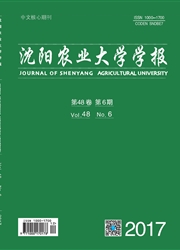

 中文摘要:
中文摘要:
为探讨低温预处理和激素浓度及其配比对直立穗型超高产粳稻幼穗组织培养的影响,以沈农265和盐丰47幼穗为试材,比较研究了外植体经5~8℃不同持续时间低温预处理,以及诱导阶段添加不同浓度的2,4-二氯苯氧乙酸(2,4-D)和6-苄基腺嘌呤(6-BA),分化阶段添加不同浓度的激动素等几种培养条件下的培养效果。结果表明:经24h低温预处理的幼穗出愈率显著提高,各处理均达89%;诱导过程中2,4-D浓度为3mg·L-1时,2个品种出愈率均处较高水平,分别达到86%以上;分化过程中激动素(KT)与萘乙酸(NAA)浓度配比为2mg·L-1/0.05mg·L-1时,是2个品种愈伤出苗的适宜浓度。因此,低温预处理、激素种类及配比是决定直立穗型粳稻幼穗离体培养的重要因素。
 英文摘要:
英文摘要:
In order to research the effects of the low temperature pretreatment and hormone concentrations and proportions for erect panicle of super high yield Japonica rice in tissue culture,young panicles were induced from Shennong 265 and Yanfeng 47.The comparative study of explants after 5 to 8℃ for different cold pretreatment times,and different concentrations of 2,4-dichlorophenoxyacetic acid(2,4-D) and 6-benzyl adenine(6-BA) at induce phase,and differentiation stages of medium containing different concentrations of several culture conditions such as kinetin(KT) under the effect of culture.The results showed that the young panicles treated in 5~8℃ for 24 hours yielded more callus compared with that treated by the other times.The callus formation rates greater than 89%.During induction of 2,4-D concentration 3mg·L-1,two species rate of callus at the highest level in more than 90%.While the appropriate concentration of KT/NAA was 2mg·L-1/0.05mg·L-1 for callus differentiation,it is suitable for two varieties concentration of callus.Therefore,the time of low temperature,hormone types and their proportions were key factors that affect the erect panicle northern Japonica rice in vitro.
 同期刊论文项目
同期刊论文项目
 同项目期刊论文
同项目期刊论文
 Effect of nitrogen fertilizer on photosynthesis and chlorophyll fluorescence in flag leaves of super
Effect of nitrogen fertilizer on photosynthesis and chlorophyll fluorescence in flag leaves of super 期刊信息
期刊信息
